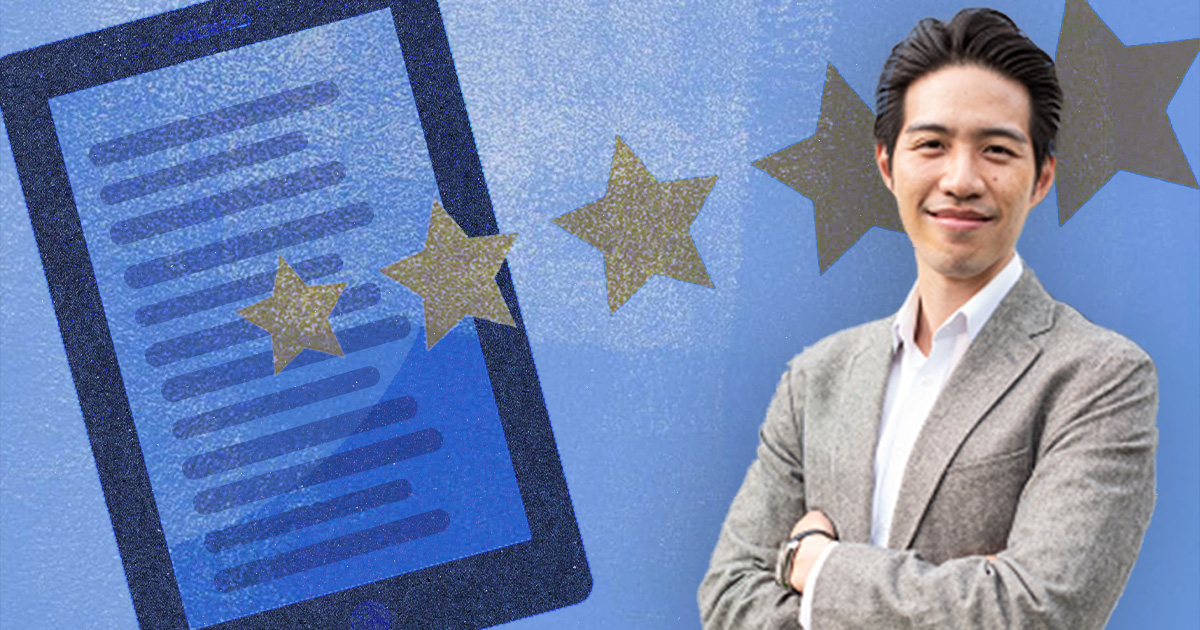
Darby Joyce
Content Marketing Coordinator
The importance and influence of online shopping goes without saying these days. As consumers turn to the internet’s retailers for everything from groceries to home furniture, it becomes even more important to know how to recognize quality products without seeing the item until it’s at their front door. Online shoppers often turn to reviews for answers on if something’s worth buying; on the surface, reading the thoughts of people who have purchased the same product serves as the digital version of a word-of-mouth recommendation. Unfortunately, some sellers take advantage of the review system by using fake reviews to inflate their star ratings and convince buyers that they’ll receive a better product than they actually will.
So, if a shopper can’t rely on reviews to tell the whole story, how can they be discerning in their online purchases? As Kogod professor of marketing Jeffrey Lee explains in his recently published research, certain language patterns can indicate that a review is fake. Taking note of those patterns can help people recognize when they’re reading somebody’s actual opinion or a hidden advertisement.
Lee’s paper, “Been There, Done That: How Episodic and Semantic Memory Affects the Language of Authentic and Fictitious Reviews,” approaches the topic of fake reviews through a psychological, theory-driven lens, which he hopes brings a fresh perspective to a conversation that has been ongoing for years. “When we started our research in 2017, fake reviews were already a big problem. However, what struck us was that most ideas were looking at which algorithms or data features could predict these reviews,” he recalled. “When we tried to amalgamate the insights across ideas and fields, it became challenging to make sense of them since they often contradicted each other. We hope our angle, which differs slightly from most, adds a valuable perspective.”
Lee and his coauthors centered the research around their prediction that fake reviews could be identified by the language they use. Where a genuine reviewer often draws upon their experiences with the product to explain why they like or dislike it, false reviewers don’t have that experience to reference. As a result, Lee explained, fake reviews tend to be vague.
There are very subtle footprints which yield evidence of having made up the story.”

Jeff Lee
Professor of Marketing, Kogod School of Business
“Clues like whether the reviews have less unique words, less concrete descriptions, less information richness—we can operationalize these features using Natural Language Processing, and they seem to reliably suggest when reviews are more likely to be fake,” he said.
To test this theory, Lee’s team ran several experiments on a dataset of reviews, using a combination of linguistic study and machine learning to uncover patterns that revealed whether a fictional review could be reliably recognized. The research combines predictive technology and pattern recognition with an analysis of memory and psychology to create a reliable method for uncovering false online reviews. Not only does it contribute to a vital discussion on improving consumer experiences, but it also approaches that discussion from a fresh angle that asks questions about how these disciplines can interact in business settings.
Recognizing real and fake reviews matters for more than just online shopping—after all, physical products aren’t the only thing being reviewed. People also take to the internet to discuss their experiences at restaurants, theme parks, and other public places, meaning that the reasons to falsify reviews also extend to those experiences. “With the rise of digital platforms, there has been an increased incentive to generate fictitious content. It’s a huge problem, and I think it’s only going to become a bigger problem in the future,” Lee said. “At present, sites like Amazon, Yelp, and TripAdvisor are filtering out hundreds of millions of reviews that are believed to be falsified.” With so many people using online reviews to inform all sorts of decisions, it’s even more critical to recognize when those reviews are genuine to understand what they’ll receive.
As an expert in digital marketing with a deep interest in the power of social media to influence purchases, Professor Lee’s interest in fake reviews came naturally. After earning his DBA in marketing from Harvard Business School, he taught courses at MIT Sloan, worked with Disney and BMW on digital marketing topics, and gained cross-cultural perspectives on technology as a faculty member at NYU’s Shanghai campus.
I was drawn to this area of work because I wanted to understand more about culture and how social influence works, why people buy certain brands, and how people convince each other to buy things online.”

Jeff Lee
Professor of Marketing, Kogod School of Business
User-generated content—reviews and social media posts, for example—provide a window into the extent of social influence on spending habits. Lee’s interest in the impact of this content has motivated his research into fake reviews and being able to sift through them to find genuine consumer responses that, in turn, answer his other questions. “I’m generally interested in the production of digital content by consumers and how this content can be analyzed,” he said. “At this point, I’m very interested in using the richness of social media data such as text, images, and videos to understand consumer behavior and successful brand communications better.”
It’s a fascinating time to be exploring such topics. With digital innovation accelerating all the time, the capabilities of people online to communicate globally and inform others’ choices are frequently changing. “During my time in marketing academia, several digital platforms have risen,” Lee said. “This has given researchers a never-before-seen opportunity to study cultural dynamics by analyzing what people say and do online.” Right now, for instance, business and technology circles (and beyond) are deeply fascinated by the potential role of generative AI in content creation going forward, and Lee is intrigued by how notable chatbot ChatGPT could be used to search for and consume information.
With all these changes in our abilities to give and take in information, students must grasp the role of social technology in those abilities. Here at AU, Professor Lee teaches Fundamentals of Marketing and Business for Communications (MKTG250), a course designed for non-Kogod majors to learn more about the intersection of marketing and media. With his research background and professional experience, Lee is uniquely positioned to impart lessons he’s learned to his students.
“I love to bring my outside experiences into the classroom whenever possible, and discussions in the classroom shape my research interests too. When we talk about digital marketing topics, I love to talk about working with BMW on social media strategy or about my efforts at detecting fake reviews,” he said. “I think students enjoy hearing these stories, and I hope to have even more stories to tell in the future.”
